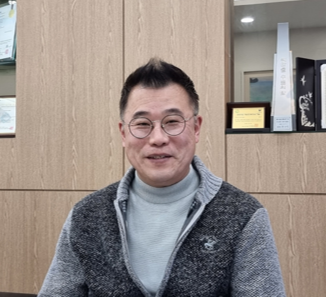- 01Company 01Company
- 02Business 02Business
- 03Press
- 04Contact
- 05Career
PRESS
立即查看ASICLAND的新聞。
The only domestic partner of TSMC: "K-semiconductor research also goes through us"
- 2023-03-04
- 0
Interview of Jongmin Lee, ASICLAND

On the 3rd, Jongmin Lee, CEO of ASICLAND, met with Herald Economy for an interview at the company's headquarters in Yeongtong-gu, Suwon.
[Herald; Jihun Kim] "We play a bridge role in making test chips for domestic research institutes or universities. We are helping to develop the domestic chip design industry," said Jongmin Lee, emphasizing that the company is playing a "bridge role" in enhancing the system semiconductor design capabilities of the national research industry.
ASICLAND, founded in 2016, is a company that serves as a design house of TSMC, which is the world's top foundry (third-party semiconductor manufacturing). A design house is a company that is responsible for converting the design materials of a fabless (design-only) semiconductor chip company into a physical form that is possible for the foundry (third-party semiconductor manufacturing) to process (backend design) at the intermediate stage between chip design and manufacturing.
Among them, ASICLAND facilitates the production of semiconductor test chips from research organizations such as KAIST and ETRI in Korea, which require this intermediate stage, by mediating with TSMC and contributing to the growth of the industry's capabilities. In Korea's major foundry company, the manufacturing process is mainly focused on chip technologies with high-level fabrication processes, such as under 7nm (nanometer, where 1 nm equals one billionth of a meter), resulting in a shortage of factories that can produce research chips with low-level(legacy) fabrication processes.
As this infrastructure is lacking in Korea, many research organizations are commissioning ASICLAND to manufacture chips through TSMC. This is because TSMC possesses various process nodes that can manufacture research-oriented chips. According to the CEO, when ASICLAND provides 100 services, about 70% of them are research-related.
He emphasized that "in 2021, out of 100 chip-related backend designs, 60 were research projects, and in 2022, out of 70, around 40 were research projects. Although it is a business with low profitability, we are continuing to receive such orders according to the needs of domestic research institutions."
ASICLAND aims to go public in September or October this year and is currently working towards that goal. It is evaluated as competitive due to its status as the only domestic partner of TSMC, the world's largest foundry company. In addition to taking care of back-end design with TSMC, which is a pure foundry that performs only the manufacturing process of chip design, ASICLAND is also enhancing its "design platform" business.
Through the design platform business, ASICLAND supplies chip platforms to make it easier for domestic small and medium-sized fabless startups to manufacture semiconductors. For example, if there is a startup that wants to produce artificial intelligence (AI) chips, they only need to make the AI chip, and ASICLAND takes care of developing the central processing unit (CPU), peripheral components interconnection (PCIe), memory chip, and other connections related to the AI chip.
The CEO explained they have a competitive advantage in providing more diverse processes to foundry customers because they cooperate with TSMC. By connecting with TSMC, they can help fabless companies produce sensors, analog, connectivity, and automotive semiconductors that are unavailable to a domestic foundry company at 180, 65, and 40-nanometer levels. In fact, ASICLAND is involved in AI semiconductor chip designs, such as Saphoen, while expanding its domestic fabless customer base. They participated in the system-on-chip (SoC) design, backend design, and development of SK Telecom's self-developed AI semiconductor chip "Sapheon X220".
Lee expressed confidence in ASICLAND's performance growth after going public. He emphasized that the foundry market is forming a duopoly structure between TSMC and Samsung. He stated “While there were over ten companies competing in the 28-nanometer process chip market in the past, now there are only two companies with a monopoly, and TSMC's profitability is on the rise.” and emphasized, “we plan to expand our business next year by forming relationships with global fabless customers, including those in the United States, beyond the domestic fabless market.”
<Source: Herald (LINK)>